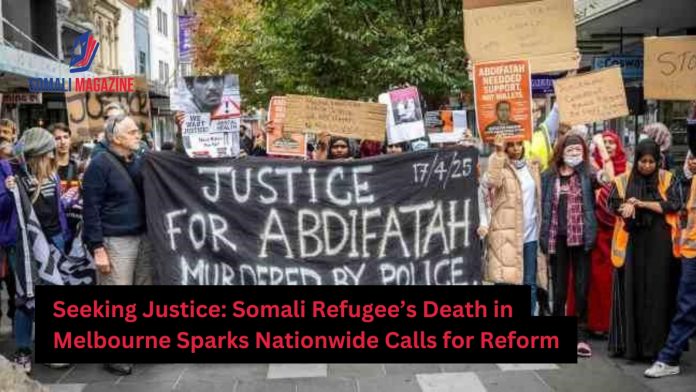Facebook Twitter (X) Instagram Somali Magazine - People's Magazine
The fatal police shooting of Abdifatah Ahmed, a 35-year-old Somali refugee, in Melbourne’s Footscray suburb has ignited nationwide protests and renewed demands for an overhaul of how law enforcement handles mental health crises. The incident, which occurred on April 17, 2025, has drawn sharp criticism from community leaders, human rights advocates, and the Somali-Australian community, who are calling for greater accountability and systemic reform.
Ahmed, who was homeless and known to struggle with mental illness, was shot dead by two Victoria Police officers responding to reports of a man armed with a knife. According to police, Ahmed refused commands to drop the weapon and charged at officers, prompting them to open fire. Despite efforts by paramedics, he died at the scene.
Victoria Police described the situation as “extremely volatile and high-risk,” emphasizing that the officers had only moments to act. However, the department has faced backlash for its use of lethal force, particularly as the officers involved were not equipped with Tasers. While Victoria Police began rolling out Tasers to frontline officers in 2021, only 60% are currently equipped, with full deployment not expected until late 2026.
The Somali-Australian community has expressed deep grief and frustration over Ahmed’s death. Farah Warsame, president of Somali Community Inc., questioned why non-lethal measures such as capsicum spray or Tasers were not used to de-escalate the situation. “It is human life at the end of the day,” Warsame stated. Community advocate Ibrahim Abdulahi Ali echoed these concerns, calling for the immediate release of body-worn camera footage to ensure transparency. “This is about a pattern—a system. A long history of Black lives being ended by state violence,” Ali said in a statement.
The incident has also sparked broader discussions about the intersection of race, mental health, and policing in Australia. Protesters gathered in Footscray on April 22, holding signs that read “Black Lives Matter,” “Justice for Abdifatah,” and “Mental Health Needs Care, Not Bullets.” The rally, attended by roughly 200 people, included speeches from community leaders and activists who criticized the systemic failures that led to Ahmed’s death.

Dr. Berhan Ahmed, CEO of Africause, described Ahmed as a “gentleman” who often sought help from local organizations. “These kids are victims of the institutional system. We don’t need to blame victims—we need to support them,” he said. The City of Maribyrnong, which includes Footscray, has since released a statement supporting calls for an independent review of the incident.
Victoria Police Commander Timothy Tully confirmed that the officers involved have been placed on leave pending an investigation by the Homicide Squad, with oversight from the Professional Standards Command. The case will also be reviewed by the coroner. Tully defended the officers’ actions, stating, “This was an incident that could have impacted the safety of a large number of people who were in the area.”
The shooting has reignited calls for police reform, particularly in how officers respond to individuals experiencing mental health crises. Advocates are urging the government to invest in alternative response models, such as mental health crisis teams, to reduce reliance on law enforcement in such situations.
As the investigation unfolds, Ahmed’s death serves as a stark reminder of the challenges facing marginalized communities and the urgent need for systemic change. For many, the tragedy underscores the importance of addressing the root causes of homelessness, mental illness, and racial inequality to prevent similar incidents in the future.

